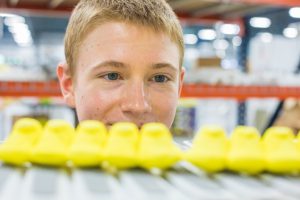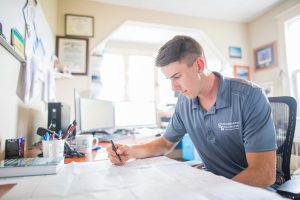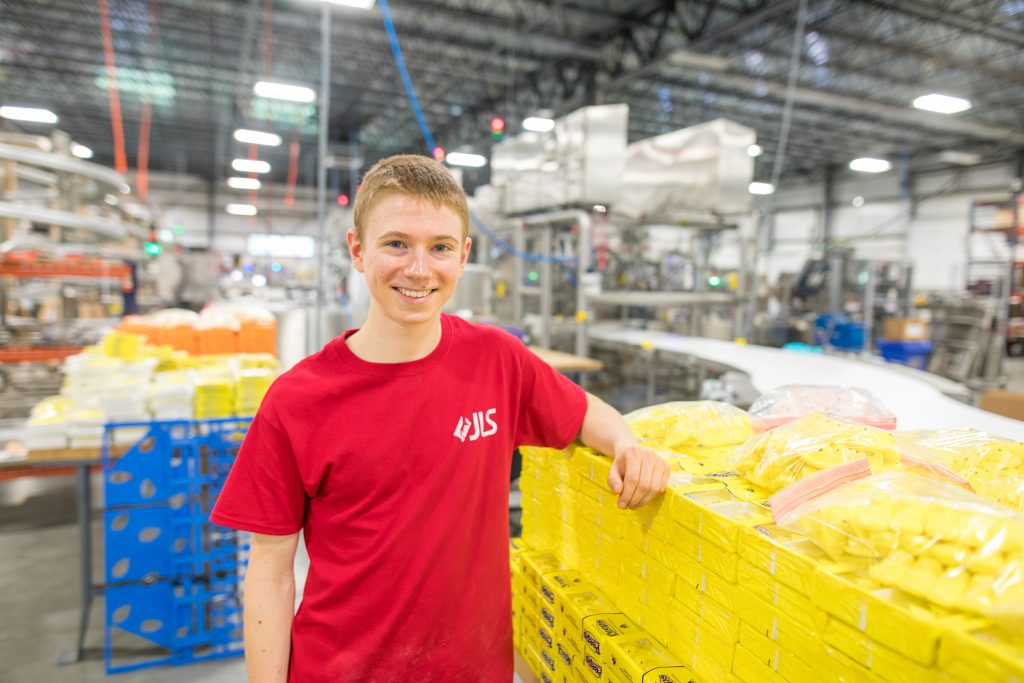You’ve seen them, those little sugar-covered marshmallows in shapes of chicks or bunnies, bright pink or yellow, so sweet you can hardly tolerate eating them without first dipping them in dark chocolate.
They’re called Peeps, and not every university student gets to box and unbox such delights – over and over again – in the name of pursuing a STEM degree.
But listen, peeps: Ben Stutzman isn’t every student.
Stutzman was one of five Eastern Mennonite University STEM students – along with Ben Zook, Dylan Grove, Andrew Troyer* and Austin Engle – to gain real-world experience through internships this summer at engineering firms in a variety of areas: buildings, hydraulics, software and yes, Peeps.
Stutzman assisted an engineer at JLS Automation in York, Pennsylvania, on a Peeps packaging system project. In May it was just a frame, but by the end of the summer he was helping with final testing of the 100-feet-long system that included four machines for folding and glueing boxes, 16 robotic arms for boxing the marshmallow creatures, and plastic wrap box wrappers.
One task was testing the system by switching out robotic parts and adjusting machinery so that it could switch from handling Peeps chicks to Peeps bunnies. That meant “loading hundreds of Peeps onto a conveyor belt, looking for problems and making adjustments as they went down the line and got packaged, and then opening up all of the packages to start over again,” he said.

“I was amazed by all the components and people that it takes to assemble such a huge system, and all the hours of testing and troubleshooting required to make it work well,” he said. “It was so cool to see everyone’s hard work pay off during the final testing at the end of the summer.”
In addition, he made tool prototypes for handling food samples (such as a bag of tartar sauce), and he managed the company’s 3D printers; he and another intern even built one from a kit.
“It takes a lot of practice to be able to 3D print something well,” he said. “You can’t just press a button and get a perfect result every time. I’ve enjoyed learning about all the settings to adjust depending on your model and the printer you’re using, and also how to manage time and materials efficiently when you have multiple people who want things printed as soon as possible.”
While he’s not sure yet what specific field he wants to enter, Stutzman said that the experience “confirmed my interest in engineering in general, since I really enjoy the problem-solving and creative nature of what I got to do.”
Potato chip factory roof

Zook worked closely with employees at the Harrisonburg structural engineering firm Engineering Solutions on projects that included visiting job sites and using software for drafting. He also helped design a potato chip factory roof.
“It was fun to think that this 3D-rendered object on my computer screen would eventually be built in the next couple months, providing help for a local company,” he said. The placement, with work days “full of new challenges” and variety, bolstered his confidence in his engineering plans.
He also realized the importance of a key component of his education at EMU: “Learning how to learn is more significant than memorizing facts, equations and techniques,” he said. “EMU has truly set me up for this realization because the classroom setting is built around improving the learning process and critical thinking skills.”
Moving from 3D-printed to metal parts
During Grove’s internship at Venture Products in Orrville, Ohio, he focused on hydraulic systems research, which included designing machine parts. The experience allowed him to take the skills he has developed at EMU – problem-solving, time management, systems thinking, general physics and mechanics understanding, and math – to the next level.
“At EMU I have enjoyed designing parts and having them come to life in the form of 3D–printed plastic. At Venture Products, I have been able to take that a step further and have my designed parts turn into formed metal. It has been really cool to think that I can design whatever component I need, and it will show up on my desk in a matter of days,” he said.
Grove also observed engineers “carrying design projects through from start to finish in an organized and well-managed fashion,” he said. “It’s really a big balancing act, and I’m very impressed with how these engineers handle it all. They work together and communicate effectively.”
And when he needed it, the Venture Products staff took the time to “drop whatever they were doing to come help me,” he said. “Over and over, I felt the encouragement to learn as much as I could.”
It was an “eye-opening” experience, and a “big opportunity,” he said. “I could definitely see myself working in a place like this for the long term.”
Classroom learning made practical

Austin Engle said his internship at the language-learning software company Rosetta Stone in Harrisonburg affirmed his interests in computer science, engineering and physics.
Tasked with helping to create tools for the software company to improve its products, he also learned “how larger companies work” and communicate, in part through participating in team and quarterly planning meetings and discussions about his and other projects.
One days-long meeting included participants from around the world, including several from Croatia. It was the week when Croatia played England in the World Cup, and watching the soccer game made for “great bonding” – and helped foster what Engle described as the company’s “supportive atmosphere.”
But the internship was also a growing experience – one challenge was beginning to learn a new coding language – that helped him see how classroom learning is applied in practice.
“At EMU, I have learned a lot of theory about how to code well and general best practices,” he said. “The biggest thing that this internship helped with seeing how that theory is applied in practice, which also helps me remember the information better.”
*Troyer completed his internship at Venture Products in Orrville, Ohio, and is currently in China on cross-cultural.

Proud of you guys and excited about the Engineering program at EMU. Perhaps I would have pursued the engineering degree had it been available. That said my EMC BA in Bible (’76) has served me well in all of my facilities management roles and I love the theological discussions you guys engage when we’ve had the chance. Engineering can be an outstanding way to serve the Kingdom. All the best!